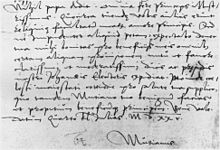Mutianus Rufus
Mutianus Rufus (German also Konrad Mutian or Konrad Muth ; * October 15, 1470 in Homberg an der Efze , † March 30, 1526 in Gotha ) was a German humanist .
His important Latin correspondence with leading humanists of the time such as Erasmus , Reuchlin and others. a., clerical and secular princes of Kurmainz , the Saxon lines, prince abbot of Fulda u. a. and their diplomats like Eitelwolf vom Stein († 1515), Valentin von Sundhausen is characterized by his perfect style, extraordinary knowledge of ancient literature and philosophical depth of thought. The correspondence made a significant contribution to Mutianus Rufus being the most important spirit of the German high renaissance after Erasmus and Reuchlin .
Life
education
Coming from a wealthy patrician family, Mutian was orphaned as a child. He went to Deventer and attended the school of Alexander Hegius , who was the rector of the monastery of St. Lebuinus. Mutianus was a schoolmate of Erasmus from Rotterdam at this time . In the summer of 1486 he studied with Conrad Celtis in Erfurt , became a baccalaureus in 1488 and finally passed his master's degree in 1492.
In Mainz he met Dietrich Gresemund , Jakob Wimpheling and Trithemius during a trip to Italy in 1496 . Trithemius made him familiar with the handling of books and inspired him to read and collect books. Mutianus Rufus amassed an extensive and valuable library.
In Italy Mutianus Rufus studied rights . He received his PhD in 1498 in Ferrara to Dr. decretorum and rounded off his legal knowledge in Padua , Florence , Venice and Rome . During his studies in Italy he heard the Bolognese scholars Philipp Beroald (1453–1505) and Urceus Codrus .
Inspired by Neoplatonism and based on Marsilio Ficino and Pico della Mirandola , he develops his own philosophical thoughts.
Scholar
In 1502 he returned to Germany to devote himself to his conception of the intellectual aristocracy . After a brief activity in the Landgrave's Hessian office in Kassel , he was offered a canon in Gotha in 1504 . This made him economically independent. Nevertheless, he continued to heavily criticize the Catholic official church. From 1505 he formed a literary circle with the humanists Herbord von der Marthen , Georg Spalatin , Heinrich Urban and Ulrich von Hutten in his open house in Gotha. Helius Eobanus Hessus and Johann Crotus Rubianus used the scholar's knowledge of ancient literature and exchanged ideas with him in Gotha. The more frequent visitor Euricius Cordus described in his Latin poem “Visiting Mutian” the poet's hermitage with its tendency towards the idyllic. After 1516 Mutianus distanced himself from Martin Luther's ideas about the Reformation.
Due to the success and popularity of Erasmus of Rotterdam, Mutianus' work was forgotten by his contemporaries. His endeavor was to live freely and righteously for himself and to support those who strive along on his philosophical path to knowledge and wisdom . Mutianus was particularly effective in personal dealings and in correspondence with patrons, friends and students.
Due to his literary style, his extraordinary knowledge of ancient literature and his philosophical knowledge, he is considered an important spirit of the German High Renaissance . Mutianus tried to combine Christian theology and ancient philosophy. Caught up in his aesthetic education religion, he felt exalted to judge the beliefs of the common people. When the appanages did not materialize in the last years of his life as a result of the Reformation and the peasant unrest , he got into an economically disordered situation.
Others
Muth's grave inscription was composed by the poet and rhetorician Johann Stigel from Gotha .
literature
- Wilhelm Ehmer : Rudolf Agricola and Konrad Mutian. Contributions to the history of the development of the personality under the influence of humanism in Germany . Dissertation Munich 1926
- Ludwig Geiger : Mutianus Rufus, Conradus . In: Allgemeine Deutsche Biographie (ADB). Volume 23, Duncker & Humblot, Leipzig 1886, p. 108 f.
- Heinrich Grimm: Mutianus Rufus. In: New German Biography (NDB). Volume 18, Duncker & Humblot, Berlin 1997, ISBN 3-428-00199-0 , p. 656 f. ( Digitized version ).
- Walter Troxler: Mutianus Rufus. In: Biographisch-Bibliographisches Kirchenlexikon (BBKL). Volume 16, Bautz, Herzberg 1999, ISBN 3-88309-079-4 , Sp. 1117-1120.
- Christoph Fasbender (ed.), Eckhard Bernstein: Conradus Mutianus Rufus and humanism in Erfurt . Gotha 2009, ISBN 978-3-910027-25-1
- Eckhard Bernstein: "Mutianus Rufus and his humanistic circle of friends in Gotha", Böhlau Verlag Cologne / Weimar / Vienna 2014, ISBN 978-3-412-22342-7
Individual evidence
- ↑ Hartfelder, Karl, "Stigel, Johann" in: Allgemeine Deutsche Biographie 36 (1893), pp. 228-230
| personal data | |
|---|---|
| SURNAME | Mutianus Rufus |
| BRIEF DESCRIPTION | German humanist |
| DATE OF BIRTH | October 15, 1470 |
| PLACE OF BIRTH | Homberg (Efze) |
| DATE OF DEATH | March 30, 1526 |
| Place of death | Gotha |
